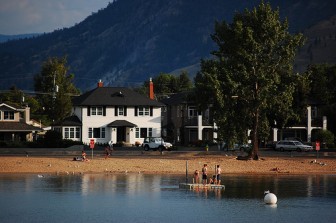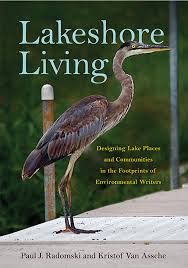
When they decided to write a book, Paul Radomski of Minnesota and Kristof Van Assche of Alberta, Canada, originally set out to make their lives a little easier.
“We wanted to organize a resource we could give to groups we were working with to provide background information,” said Radomski, who said the book made it easier to connect with clients.
“It was self-interest, in many regards.”
But “Lakeshore Living,” the book Radomski and Van Assche co-authored, is valuable far beyond non-profit organizations and lake associations. Touching on ecology, urban sociology and more, the book is an idea manual for how to improve the quality of lakeshores and those who inhabit them, human or otherwise.
Radomski recently spoke with Great Lakes Echo about his book, reaching out to lakeshore residents and the future of lake communities.
GLE: What are the most important points that you hope lakeshore residents will take away from your book?
PR: In our work, we communicate a lot about issues and pressures and stressors that lakes are facing. Pollution, phosphorus, nutrient pollution, impacted water quality, development affecting fish and wildlife habitat and part of this book can explain to residents these things they may not be aware of.
An example would be the notion of how rainwater is being managed at a lake home or municipality and how this mismanagement of rainwater can affect the water quality. And from Kristof’s point of view, which is a landscape architect point of view, is getting people to ask how can you go about things in a sustainable way that protects the features of the neighborhood.
GLE: Are there common harmful behaviors of lakeshore residents that maybe they don’t know are hurting their lakes?
PR: Yeah, I think so. We have a lot of conversations about this when we go out in the field and talk to people. A common approach to managing someone’s lakefront home or property is very similar to how we treat our homes in suburbia and elsewhere, except on the lakeshore, your actions can affect the lake.
People remove aquatic vegetation, which is an important nearshore habitat for fish and wildlife. People remove downed trees, which can also serve as a habitat. And once we explain things like that to people, they say, “Oh, we didn’t know that. We were just treating it as our suburban yard.”
There are other things, like managing runoff to minimize the amount that will reach the lake. It’s about changing your actions to improve the environment around your home.
GLE: You use the work of many different researchers in your book and one that popped out was William Whyte. In a book about the natural environment, it initially seemed odd to include the work of someone who most people would think of solely as an urban sociologist. How were his ideas valuable to you?

PR: His work was really critical. Here in Minnesota, I see this spectrum of development and we wanted to make sure we incorporated development like that. I had read William Whyte’s work long ago, and a lot of his lessons cemented in my mind about how we manage not only development, but the lakeshore itself.
He was a pioneer relating to conservation, subdivisions, cluster developments and then he got into urban environments and helping big cities like New York manage their public space. And around the country, a lot of our lakes are in these urban areas. There’s wisdom in his work of how we can incorporate public spaces around lakes to increase the value for our cities and communities.
GLE: What do you hope the typical lakeshore community will look like in ten years?
PR: Personally, I’d like to see more public access to lakes. Some communities I go to, the development around it is made up of small lots and private development. And I recognize the economic importance, but we need to promote greater access for the people that live around those lakes. And then in terms of the lakefront, I’m hoping for better protection of the natural resources in and around the lakes. We need to be stewards of that environment.
I’d like to see what most people would like to see, that we’re protecting the unique characteristics of places we like to go visit and should cherish.